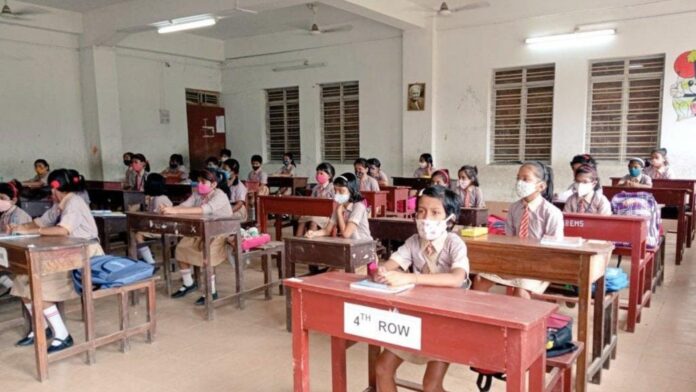Mollika Lahiri
SHILLONG:
The Centre introduced the New Education Policy (NEP) 2020 in a bid to popularise skill-based learning. This came after 34 years of the National Education Policy of 1986. The NEP 2020 intends to provide a large scope to bring about metamorphosis in the Indian education system. This switch is expected to pave ways for the development of students to their maximum potential.
This extensive policy aims for a 100 per cent Gross Enrolment Ratio (GER) in school education by 2030 for which principles like evaluation of the effectiveness of the policy and rigorous cost-effectiveness of its implementation has to be kept under constant check.
When teachers and principals were asked about the implementation in Meghalaya, they listed various ground level issues that have been plaguing the education system in the state.
“The idea is to give the same quality of education to everyone, not only in the urban areas but also in the rural areas. But if there is no infrastructure how will NEP work?” questioned Purnima Sharma, retired Principal of Rilbong P.N. Chaudhari School, in a conversation with The Meghalayan.
Sharma went on to say that government-aided schools like theirs receive minimal help from the state government. However, the NEP suggests that education now will be based 50 per cent on activities and 50 per cent on academics wherein the first-hand sufferers will be the students of such government-aided schools who are not only economically backward but also first-generation learners in their families.
NEP 2020 aims at transforming the education system of the country by making knowledge accessible to all.
To fulfill the vision and make education universal, various new concepts have been introduced that include vocational courses like pottery, carpentry among others.
Chhanda Bhattacharjee, Principal of Laban Bengalee Girls’ Higher Secondary School pointed out the challenges of introducing vocational courses.
“With regard to the vocational subjects, my only question is who will teach these? The teachers that are being appointed in our schools are all merit-based and focus on academics … But if we talk about skill development, teachers have to be trained first and be specialised in such subjects.”
The educators were of the opinion that teachers like them who have completed so many years of service and are now on the verge of retirement are no longer capable of adapting such skills without vigorous training.
“I don’t disagree, but in a bunch of 20-30 teachers only 2-3 can be skilled enough to pick up such abilities to teach vocational courses. It’s all about passion. The only solution now is that with the passage of time, we have to switch our recruitment system from merit-based to skill-based to cope up with the ever changing system,” added Bhattacharjee.
Apart from major issues like poverty and inaccessibility that the state faces, there is also a high dropout rate in the state. According to the Unified District Information System for Education (UDISE), dropout rates for Meghalaya hiked from 7.4 per cent in 2020-21 to 9.8 per cent in 2021-22.
In 2016-17 Meghalaya had recorded a dropout rate of 17.69 per cent against the national average of 6.35 per cent.
In spite of these issues, educators said nothing was impossible.
Sharma expressed confidence and mentioned how the intention of the NEP is for the betterment of the education system.
“I agree that the intention of the NEP is very good and for the benefit of the students but its implementation will be a Herculean task. But, it will be easier if they start implementing it in phases and not all at once, “ added Sharma .
For adhering to such large-scale implementation, the state needs a strong teaching community that is keen to adapt to the new multi-disciplinary system of education under the NEP 2020.
It is also a matter of concern, whether the state has resources to provide such teachers after years of uncreative and stereotyped learning.
Sharma said, “The administration has to bring in expert resource persons from outside to train the teachers and most importantly there should be examinations after the training. Only this will help in analysing whether the teachers are properly skilled for the task of moulding the students.”
The pandemic had also a major role to play in disrupting the state’s education system.
“Necessity is the mother of invention and as things come by, we will also eventually learn. We combated the Covid situation, then why not this? But the government has to firmly take a stand and map out the implementation,” said Bhattacharjee while emphasising that the word ‘no’ never existed in the lexicon of teachers.


